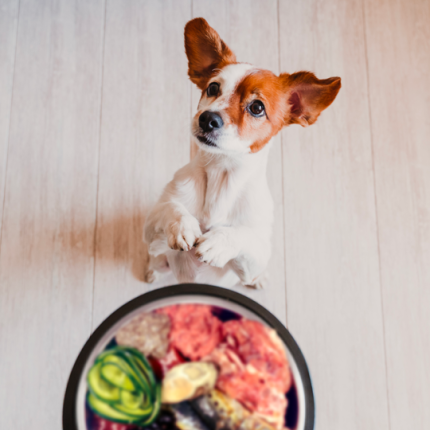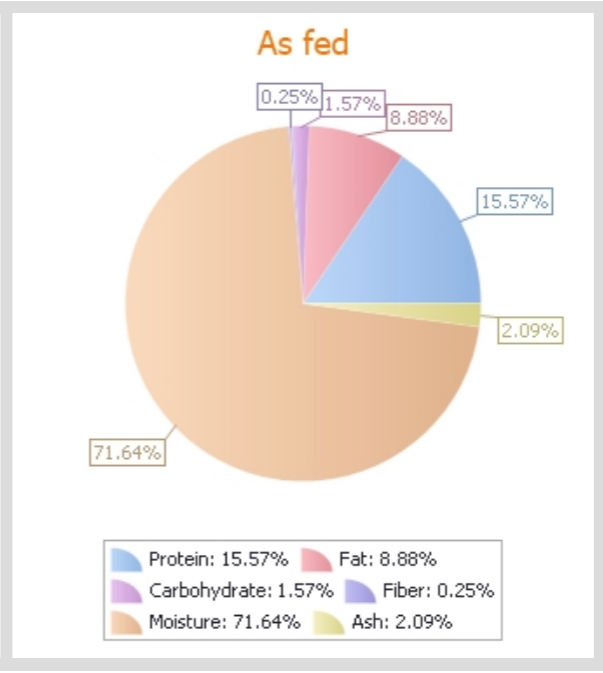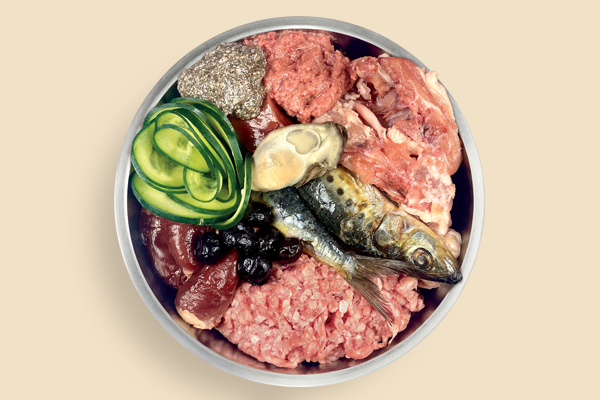DIY Chicken Bowl

For those who like to fully take the reins on their journey to Truly Raw, we’ve partnered with a certified canine nutritionist to create our DIY Raw Recipes series. These meals incorporate our DIY Parts products and other raw ingredients and are step-by-step recipes that you can follow to ensure you’re feeding your pet a complete and well-balanced raw meal.
This recipe is balanced for All Life Stages to Nutritional Research Council (NRC) nutritional guidelines for dogs by our in-house certified canine nutritionist. This recipe is complete and balanced as it is written, and any ingredient changes or substitutions can affect the balance of the recipe.
Batch Recipe Ingredients
- Carnos Boneless Ground Pork – 2,220g
- Carnos Chicken Hearts – 950g (can substitute Carnos Turkey Hearts if preferred)
- Carnos Chicken Frame – 1,600g
- Sardines – 700g
- Carnos Beef Liver – 200g
- Carnos Chicken Organ Mix – 200g (can substitute Carnos Turkey Organ Mix or Carnos Pork Organ Mix if preferred)
- Canned Oysters, in water, drained – 200g
- Cucumber – 700g
- Chia Seeds, ground – 40g
- Solgar Chelated Manganese, 8mg – 2 tablets
- NOW Iron Bisglycinate, 18mg – 7 pills
- NOW kelp powder – 5 scoops
- NOW vitamin E dry capsules – 2 pills
Recipe Total Yield = 240 ounces = 15 pounds
Recipe Calories per Ounce = 41.6kcal/ounce
Recipe Macronutrients = 15.57% protein, 8.88% fat, 1.57% carbohydrate

Required Prep Supplies:
Meal containers, adequate freezer space, cutting board, knife, kitchen food scale, spice grinder, blender.
How to calculate appropriate feeding amounts for your pet:
This is a very general guideline for calculating feeding amounts:
Adult dogs: 2% of bodyweight for inactive dogs, 2.5% of bodyweight for most average dogs, and 3-4% of bodyweight for highly active dogs.
Puppies: Puppies will typically start at 8-10% of bodyweight at 8-10 weeks of age. The percentage will slowly decrease as their weight/age increases. You want to feed enough that your puppy is not underweight, but not enough to make them chubby so take care to monitor their weight gain as they grow an adjust feeding amounts as necessary.
Example: A 45-pound healthy, average adult dog fed at 2.5% of their body weight should be fed 18 ounces of food per day.
*Every dog is an individual and their metabolism is unique to them. Feeding amounts should be adjusted as needed. If a dog is too thin and health issues have been ruled out, increase daily food. If a dog is too heavy and health conditions have been ruled out, decrease food within reason.
Meal Prep Instructions:

- Calculate how many days the recipe will last your dog. The batch can be doubled or tripled if desired. Set out the required amount of tupperware or bento boxes to hold meals.
For example: if your dog eats approximately 1lb per day, the recipe as is would 15 days, and you would need 15 containers that are large enough to hold 1 pound of food. Larger dogs will need larger containers and feeding amounts, while smaller dogs will need smaller containers and amounts.
- Thaw meat ingredients.
- Dissolve manganese tablets in water and set aside
- Grind chia seeds for optimal digestion in a spice grinder. Place in a bowl and add the powder supplements (open any capsules). Mix chia powder and supplements thoroughly
- Blend the cucumber well. Slowly mix or blend the chia/supplement powder into the blended cucumber. Ensure it is mixed well.
- Portion out each ingredient as evenly as possible into the meal containers
- Place 2-3 containers in the refrigerator and store the rest in the freezer. Remove 1 container from the freezer each day as 1 thawed container is used. Daily containers can be split into 2 meals per day if desired.
- An alternative prep method would be to use a grinder that can handle small meaty bones, and grind all ingredients together and mix thoroughly, then portion as needed.
Prepping Tip: use the total weight of ingredients rather than weighing each daily amount for each ingredient. In the example of prepping this recipe for 15 days, take the total 200 grams of liver and divide into meal containers as equally as possible. No need to weigh ingredients individually for each day.
Nutritionist Tip: This is a lower fat recipe that may help with weight loss or dogs who struggle with higher fat. Raw sardines contain an enzyme called thiaminase that renders the B vitamin thiamin unavailable when they come in close and prolonged contact. If you are grinding the entire recipe, it is recommended to avoid mixing in ground sardines and storing mixed. Ground sardines can be stored separately until feeding time, or kept whole and laid on top of meals. Sardines can also be very gently cooked to inactive thiaminase.